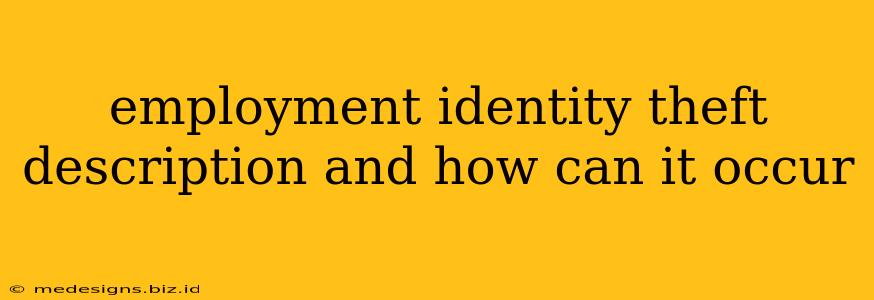Employment identity theft, a sneaky and damaging form of identity theft, occurs when someone uses your personal information to obtain a job or employment benefits. This isn't just about stealing your paycheck; it can lead to serious financial and legal repercussions. Understanding how it happens and how to protect yourself is crucial.
What is Employment Identity Theft?
Employment identity theft is the fraudulent use of another person's name, Social Security number (SSN), address, or other identifying information to secure employment. The thief might use your information to:
- Apply for a job: They might submit a fake resume and application using your details, potentially securing a position you never applied for.
- Claim unemployment benefits: They could file for unemployment in your name, collecting benefits that rightfully belong to you.
- Obtain a loan or credit card: Some employment applications involve credit checks. A thief could use your good credit history to their advantage.
- Commit tax fraud: Using your SSN to file taxes and receive a fraudulent refund.
The consequences for you can be severe, including:
- Difficulty finding employment: Your credit report might reflect fraudulent activity, making it harder for you to get a job.
- Financial losses: Lost wages, unemployment benefits, and tax refunds.
- Legal trouble: Facing accusations related to the thief's actions.
- Damaged credit score: This can affect your ability to obtain loans, rent an apartment, or even purchase a car.
How Does Employment Identity Theft Occur?
Employment identity theft can happen in several ways:
1. Data Breaches:
Large-scale data breaches at companies holding your personal information (like previous employers or credit bureaus) are a major source of stolen information. Hackers can access your SSN, address, and other details and use them for fraudulent employment applications.
2. Phishing and Email Scams:
Phishing emails designed to trick you into revealing personal information are another common vector. These emails may appear to be from legitimate employers or government agencies, prompting you to enter sensitive data.
3. Paper Applications and Mail Theft:
Traditional paper job applications containing your personal information can be intercepted and misused if not properly secured. Mail theft is another way for criminals to access your information.
4. Insider Threats:
In some cases, employees of a company might steal the personal information of their colleagues for malicious purposes, including securing employment under a false identity.
5. Weak Password Security:
Using weak or easily guessable passwords on online job portals or company websites makes it easier for hackers to gain access to your accounts and steal your data.
Protecting Yourself from Employment Identity Theft
- Monitor your credit report regularly: Check your credit report from all three major credit bureaus (Equifax, Experian, and TransUnion) for any suspicious activity.
- Be cautious with online applications: Only apply for jobs through reputable websites and avoid providing sensitive information unless absolutely necessary.
- Use strong passwords: Create strong, unique passwords for online accounts, and consider using a password manager.
- Shred sensitive documents: Properly dispose of any documents containing your personal information, such as old pay stubs or tax returns.
- Be wary of phishing emails: Don't click on links or open attachments from unknown senders.
- Review your employment records: Regularly review your employment history to identify any inconsistencies or unfamiliar entries.
- File a police report: If you suspect you're a victim of employment identity theft, report it to the police immediately.
- Contact the relevant agencies: Report the theft to the appropriate agencies, including the Social Security Administration (SSA) and the Federal Trade Commission (FTC).
By understanding the risks and taking proactive steps, you can significantly reduce your chances of becoming a victim of employment identity theft. Remember, staying vigilant and informed is your best defense.
